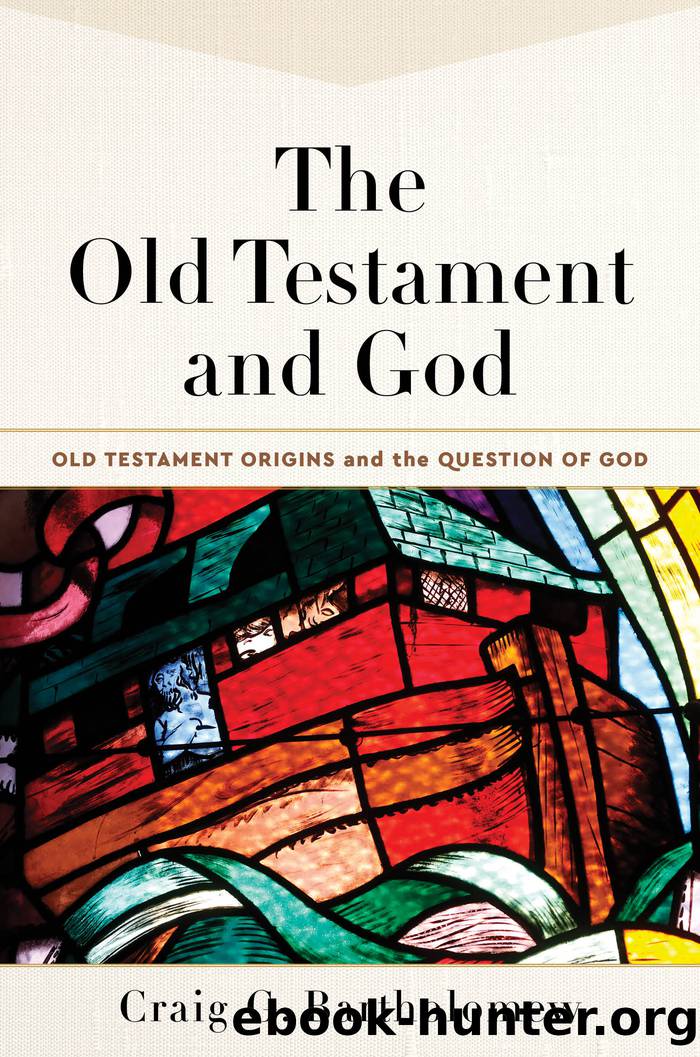The Old Testament and God by Craig G. Bartholomew

Author:Craig G. Bartholomew [Craig G. Bartholomew]
Language: eng
Format: epub
Tags: Old Testament, REL006090, REL006210
ISBN: 9781493432066
Publisher: Baker Publishing Group
(f) Conclusion
For those of us who love OT studies, as do I, once we see that in the Bible, as in these nations of the ANE, religion relates to all of life, cultures such as that of the Hittites become quite fascinating. As with the other ANE nations, Hittite culture was predominantly agrarian, and for the Hittites nature was alive with gods, something that it is hard for urban Westerners to begin to grasp, removed as we are from nature. Archaeology reveals a highly sophisticated culture; for example, the ceramic pottery produced by the Hittites â for both cultic and common use â is often aesthetically remarkable.
The Hittite Empire is dated to the fourteenth and thirteenth centuries BC, and these were the very centuries in which the oppression of the Israelites in Egypt, Moses, the exodus and the Sinai event are dated, assuming they are historical. Ramesses II led the confrontation with the Hittites and he was probably one of the pharaohs referred to in Exodus. If during this time Moses was being raised and educated in Pharaohâs court, he would undoubtedly have heard all about the Hittites and their clash with the Egyptians, as well as witnessed the typical pharaonic refusal to acknowledge defeat, always maintaining âthe big lieâ of perpetual victory. If Mosesâ education was as rigorous as I suspect it was, then it is likely too that he would have been inducted into the treaty form canonized by the Hittites.
The Hittite world view is typically polytheistic with the typical ANE view of the gods as larger-than-life humans. The gods depend on the Hittites for their very survival, and the king and the Hittites depend on the gods for theirs. This co-dependence underlies the absolute authority of the king as the mediator between the people and the gods. An intriguing motif in the Hittite view of the gods is the need people felt to attract their attention. Of course, if humans had relieved the gods of hard labour then it is not altogether surprising that the deities needed to be attracted by the Hittitesâ service of them. This is a very different attitude from the other-person centredness of Elohim and YHWH in the OT.
The crucial role of the Hittites in the development of the treaty tradition of the ANE brings us on to the terrain of relationships between nations, what we nowadays call international affairs. If Egypt was relatively isolated, neither the Hittites nor the Israelites were shielded from other powers. The multicentric world view reflected in the treaties reminds us of the multicentrism in the Table of the Nations, as discussed in Chapter 1. However, there the similarity ends. If the Hittites shared, as they seem to, the cosmology of the Sumerians, a marked difference from the city states of Sumeria is the centralized political and military power of Hatti. Indeed, it is this that facilitates and leads to the Hittitesâ celebration of war, conquering and defeats, and results in changes in organization and administration, leading not least to the use of treaties to maintain their power.
Download
This site does not store any files on its server. We only index and link to content provided by other sites. Please contact the content providers to delete copyright contents if any and email us, we'll remove relevant links or contents immediately.
| African American | Amish & Mennonite |
| Biblical Fiction | Classics & Allegories |
| Collections & Anthologies | Contemporary |
| Fantasy | Historical |
| Mystery & Suspense | Poetry |
| Romance | Science Fiction |
| Westerns |
Bittersweet (True North #1) by Sarina Bowen(4846)
Housekeeping by Marilynne Robinson(4449)
Royally Matched (Royally Series) by Emma Chase(4324)
The Rosie Effect by Graeme Simsion(3469)
The Cellar by Natasha Preston(3346)
The Husband's Secret by Liane Moriarty(2557)
The Wrong McElroy by KL Hughes(2488)
His Forgotten Fiancée by Evelyn M. Hill(2413)
The Partner by John Grisham(2398)
Plain Protector by Alison Stone(2393)
Her Hill Country Cowboy by Myra Johnson(2310)
Her Cowboy Boss by Patricia Johns(2129)
Unlocked: A Love Story by Karen Kingsbury(2127)
A Kingsbury Collection by Karen Kingsbury(2106)
Unworthy by Antonio Monda(2090)
The Masterpiece by Francine Rivers(1992)
Outsider by Castillo Linda(1905)
01 The Rising by Tim Lahaye(1892)
Unplanned (A Kennedy Stern Christian Suspense Novel Book 1) by Alana Terry(1867)
